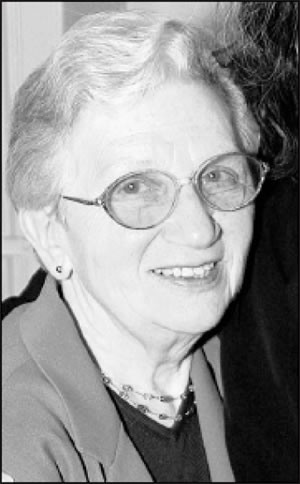By Ed Gold
Roberta deJoia, a tiny dynamo and an early reform activist who helped the Village Independent Democrats topple the famed Tammany Hall leader Carmine DeSapio in the early 1960s, died in London on March 11.
Bobby, as she was called, was 76 years old and succumbed to cancer.
Smart, creative and energetic, she left her mark on both sides of the Atlantic.
In Greenwich Village, she was a key staffer for V.I.D.’s newsletter, which helped increase the political club’s membership to almost 1,000, and helped bring Village reformers victory in the Democratic Party in 1961. She also served as “one of our hardest-working election district captains,” according to V.I.D. veteran Micki Wolter, a specialist in election organization who later served in former Mayor Ed Koch’s administration.
Passionate in their liberalism, the deJoias in 1963 joined the V.I.D. contingent that participated in the famous Martin Luther King March in Washington.
Though she and her family relocated to England in 1967, she maintained strong friendships with several of V.I.D.’s early leaders, notably Sarah Kovner, then Democratic state committeewoman and V.I.D. campaign manager in the 1961 win over DeSapio, who later served in the Clinton administration; and Carol Greitzer, a former club president and district leader who was a city councilmember for more than two decades.
Greitzer recalled that “Bobby was still a New Yorker after living in London for 40 years, and she regularly asked about local and national politics here.”
Born in New York City in 1932, she graduated from Syracuse University and became one of the only female reporters on the then Long Island Press, where she worked in the ’50s and ’60s.
At one point, Bobby decided to take French lessons and it changed her life. She never learned French but married the teacher, Alex deJoia, who also joined V.I.D.
Her husband became one of the few Americans to learn Mongolian, and the government wanted to send the couple to Mongolia to represent the U.S. Bobby, always strong-willed, vetoed the offer.
But in 1967, Alex received a two-year research fellowship from University College in London, and the deJoias, with daughter Amy, who was then 5, crossed the Atlantic.
Bobby remained energetic and creative in England. One of her major initiatives was the founding of Heath Hands, which is modeled after the Central Park Conservancy and now has hundreds of dedicated conservation volunteers.
In planning her operation, she sought assistance from Kovner, who introduced her to key people in New York City’s Parks Department. A few years ago, she brought a group of Heath Hands activists to New York where they received red carpet treatment from the Parks Department.
Her energy level never wavered. She was a columnist for the Ham & High newspaper in Hampstead, a section of London. She became director of communications at Middlesex University, where she created the “Silver Studio Collection,” focused on textiles, drawing attention from commercial, museum and research organizations. At Hornsey College of Art she taught
journalism.
When her husband died in 2004, she raised almost $200,000 to create an International Slavery Museum in his memory, telling the honest story of the slave trade and slave rebellion.
Her daughter Amy, now 45, worked closely with her on the museum project and was at her bedside when she died. Amy recalled her mother was guided by the epigram: “When your belief is strong and your purpose is just, no obstacle can stand in your way.”
Her daughter noted that Bobby never stopped supporting good causes. She was active in the Hampstead Conservation Advisory Committee and the Royal Free Hospital’s Public Involvement Forum. Amy remains director of development and communications for the slavery museum.
This past Saturday, friends and family celebrated her life at Burgh House in Hampstead. The Kovners, Sarah and husband Victor, a well-known lawyer specializing in civil liberties, flew to London to participate. Her newspaper editor, Geoff Martin, noted that “Bobby had a big personality and great powers of persuasion.” And Jeremy Wright of the Heath and Hampstead Society aptly labeled her “a little dynamo of an American woman — she was very lovable.”
Besides her daughter, Amy, she is survived by two grandsons, Jack and Tom, and her son-in-law, David Brewitt, all of Liverpool; and a sister, Faith, of Pleasantville, N.Y.
Those wishing to contribute in her memory may do so through the following organizations: Heath Hands, West Lodge Kenwood, London, NW3 7 JN, England; International Slavery Museum, Dock Traffic Office, Albert Dock,
Liverpool, L3 4 AX, England; and Marie Curie Cancer Care, 89 Albert, Embankment, London, SE1 7 TP, England.






































